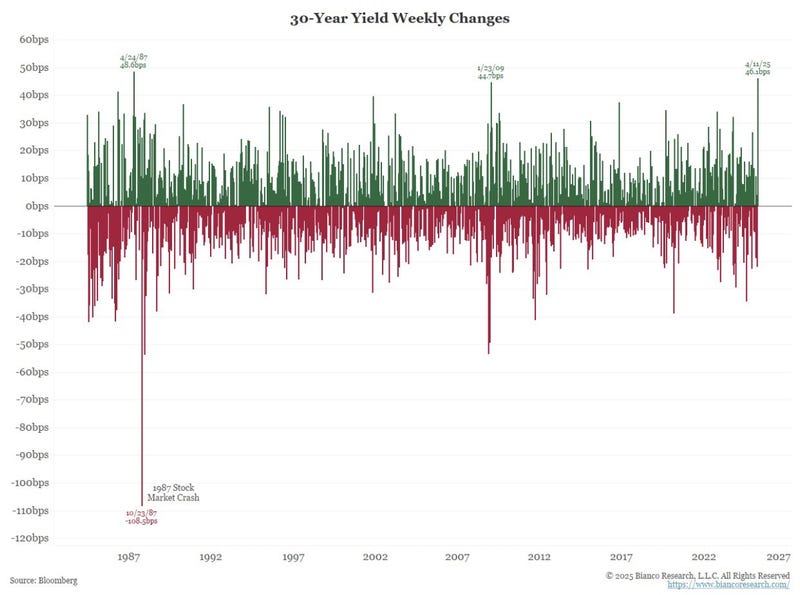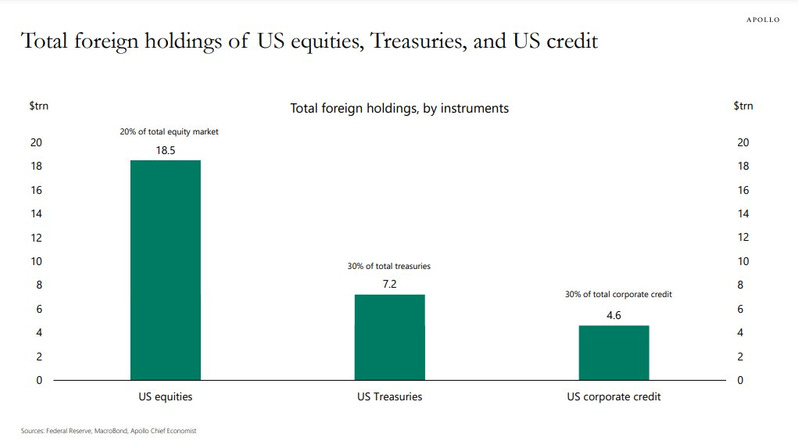Becoming Argentina: Regressive Is So Back
This was a promising week for America—but we’re far from out of the woods and still moving in the wrong direction. Published April 13, 2024
Wait, how was this a good week? Trump was forced to back off on his attack on global trade, which slowed the process of the disorderly dismantling of the American hegemon.
Exactly. A Pause is the best we can hope for when decades of American Exceptionalism are being unwound at the speed of Truth Social posts. The trolling videos are pretty hilarious.
Over a year ago, I began writing about the toxic combination of unchecked fiscal spending and economic populism—my America is Becoming Argentina Thesis. I didn’t expect Trump would fully expose America’s most vulnerable flank (USA SMBs and foreign holdings) in less than 70 days back in office.
Let’s recap. In two months, we’ve swung from talk of creating a sovereign wealth fund—an idea grounded in savings and long-term vision—and issuing $5,000 checks from cost savings, to announcing a $1 trillion defense budget and White House capitulation to the seizures in the bond market. Not exactly hallmarks of inspiring leadership
There’s broad agreement that America’s fiscal path and woke ideology need correction. The latter is being addressed quickly. Tip my cap to the Trump administration on this.
The Tariffs are a regressive tax on America. Say it again, they are a regressive tax on Trump’s non-wealthy base. Further, there will soon be more exemptions than IRS loopholes for the rich.
Our apologies to poor kids across America. Apple’s bottom line and the machines that make our most strategic technology—deemed vital to national security by both Biden and Trump—will not be materially tariffed, but your toys will. Help it make sense.
The entire policy is a grotesque display of regressive economics, hitting the poorest in society the hardest. While large corporations may weather the storm with bailouts and tariff exemptions, small and mid-sized businesses (SMBs) are exposed to uncertainty and rising costs with little recourse. This is the harsh truth for America’s entrepreneurs in Trump 2.0.
Imagine where mid-size American farmers would be without ongoing government support. It's not hard to foresee the rollout of an “Unfair Trade Payment Protection Program” (UT-PPP) to cushion the blow, especially if policy instability worsens. You heard it here first.
Prices are expected to rise in America, primarily affecting the items people purchase. No one gives a $%#& if Audis get more expensive.
Economists argue that some inflation is good, as it signals a thriving economy and robust demand. They often rely on flawed metrics to prove this point—particularly cyclical and seasonal fluctuations in commodity prices, to argue that inflationary spikes are temporary events needing to be "adjusted" away.
However, commodities themselves aren't inherently inflationary. Technological innovation and increased production typically drive down prices once they spike, revealing their natural tendency toward mean reversion. Persistent commodity price inflation primarily arises from currency debasement or inflationary expectations—exactly what we're beginning to witness today.
Consider this example: On one left side, we have Rory McIlroy’s earnings from Masters tournaments since 2009; on the right, the MSRP and real-world selling prices of Ford F-150 pickups over the same period. I avoided using 2009 data to prevent skewing the analysis further in favor of my argument, as that year marked the bottom of the Great Financial Crisis. We don’t pay for gasoline until after we purchase the pickup truck.
Finally, look at the rapid escalation of healthcare expenses per employee. Obamacare’s ACA was a lesson in unintended consequences and deserves blame. Yet, three administrations later, the costs are going parabolic. The only solution for small businesses is for the government to fix it.
How in the hell can anyone genuinely expect a resurgence of jobs in the Rust Belt and Midwest if this is the trajectory for healthcare costs?
Becoming Argentina
In my ongoing commentary, I often refer to “the US becoming Argentina” as a metaphor to describe the growing presence of state intervention in the U.S. economy. This is a framework to understand how a government can gradually assume the role of economic gatekeeper—shaping markets, championing businesses, and influencing individual livelihoods under the banner of protectionism and fairness.
Argentina’s recent political era—defined by Kirchnerism—offers a useful case study. At its core, Kirchnerism is a highly politicized, corrupt extreme of Peronism. Juan Peron’s movement was grounded in nationalism, labor rights, and populist ideals. Cristina Fernández de Kirchner became a powerful symbol of this model—offering subsidies and government support to the lower classes while using state control to protect politically aligned businesses from competition. Upon her husband's death, she rode the wave of a grieving widow, champion of the lower classes, to stardom.
Sidenote: Watch Yosi the Regretful Spy on Amazon or read the story. The Kirchners have had ties to virtually every evil or corrupt conspiracy that has befallen Argentina since they entered politics a generation ago.
Key economic policies included price controls, import restrictions, direct cash transfers, and state-funded subsidies—all funded by an increasingly overburdened central bank. When foreign-owned competitors threatened to outproduce local players, nationalization was the ultimate checkmate. Inflation spiraled, and yet the narrative of social justice persisted, shielding the ruling class from criticism.
Sound familiar, my left-leaning friends?
This dynamic doesn’t originate solely from the political left. Trump’s policy outcomes show that state control and populist rhetoric can easily come from the right, especially when nationalism and resentment are leveraged to gain support. Juan Perón’s original platform, if read today, might not sound too different from certain policies in places like California—where labor rights, protectionist leanings, and broad social programs are central to governance.
Argentina’s economic trajectory since the early 2000s has been shaped by:
Heavy regulation
Persistent subsidies
Protectionist policies
Currency devaluations
To sustain such a model, public support is often mobilized through national pride, economic resentment, or the creation of external adversaries.
It’s worth asking: Are we observing a similar pattern in the USA? The intellectually honest answer is yes and yes.
In the last 48 hours, SMBs have a whole new reason to panic. Exemptions will be given to large companies and strategic importers decided by the state. See the use of the word “state” there?
Two Critical Questions
1) Can Trump stop the race toward protectionism from becoming a weapon of the state, where the politically connected businesses and leaders receive access and favors not available to others?
This means an entire revamp of his impulsive need to enforce top-down protectionism. The lack of strategy and foresight is inexcusable.
Here is a thought experiment that should have been completed in 2016. In a protracted financial war that takes the form of an embargo, is the pressure inherently on the importer and the exporter?
I believe the pressure is on the importer, especially when it becomes a war of attrition with such grotesque imbalances. This would be for two equivalent societies. Factor in a Democracy and an authoritarian government. If I can figure this out sitting by myself in Uruguay, what is going on in this White House?
2) Can Trump swallow his pride and learn from these impulsive mistakes?
Here are two examples of how Javier Milei’s impulsive, heavy-handed actions and words got him into tough spots—his ability to reverse course saved his administration.
Javier Milei is the most ideologically driven free-trade capitalist leader. His election confirmed overwhelming popular support, securing approximately 60-65% of the popular vote (my estimate). Initially, Milei took a firm ideological stance, declaring he would not engage in trade with communist nations, using notably strong language concerning China’s human rights record—once rhetorically asking, “Would you trade with an assassin?”
Despite these harsh comments, Beijing remained diplomatically restrained, never publicly criticizing Milei directly. Instead, China began quietly reevaluating their financial relationship with its financially stressed supplier. There were several moments where the fragile government would have been extremely vulnerable to Beijing’s wrath.
Over time, Milei openly acknowledged the complexities involved in international trade and governance. He expressed regret over his earlier remarks, acknowledging the responsibilities that come with leading and representing all 48 million Argentines.
“China is a very interesting trade partner, because they don’t make any demands, they just ask that you don’t bother them,” he said when asked about his stance on China. The country is one of Argentina’s top trading partners, along with Brazil.
“I was very pleasantly surprised with China,” Milei said during the interview with Giménez. “We had a meeting with the ambassador and, the next day, they unlocked the swap for us.”
The USA needs to reshore strategic and national security interests. America needs to produce its own medicines and vessels. America’s #1 priority should be creating jobs in America to accomplish these goals. Yet, starting an unprepared global trade war and then reversing course after nearly breaking the world’s most liquid market in under a week is the worst strategic blunder of my lifetime. Full stop
The stock market will trade higher early this week, but it will not slow the decline of US Exceptionalism of the Financial Markets. Trust is broken, and the world needs fewer dollars. Holding dollar assets becomes a liability in a world with less trade and broken trust. It is that simple.
Reversing Course
After his inauguration, Milei introduced an ambitious omnibus bill designed to comprehensively reform Argentina's struggling system (Ley Bases). While impressive in scope, this sweeping approach proved politically naive. The extensive legislation offered something for nearly every lawmaker to contest or request be removed, leading to a significantly weakened final version that could be passed.
Milei’s attempt to overhaul the political system in one bold move revealed a critical lesson: meaningful reform requires coalition-building and earning trust across the political aisle. Since then, Milei has adopted a more strategic approach, carefully choosing his battles and moderating his rhetoric to better secure cooperation.
Even in Argentina, one of the most popular world leaders needs alliances and pragmatic diplomacy to effect positive change.
Can Trump channel his inner-Milei and get this back on track? Can he forge alliances needed to tackle his grand ambition to reorder world trade?
If he is unable or unwilling, then the path to Argentina only accelerates.
I will leave you with this last inherent contradiction to ponder. Trump’s supporters argue he needs more time; it’s too early to judge. The administration has made clear this is a crisis, requiring immediate action.
It cannot be both when you risk dismantling everything that made America the richest country in the world in a matter of weeks.














